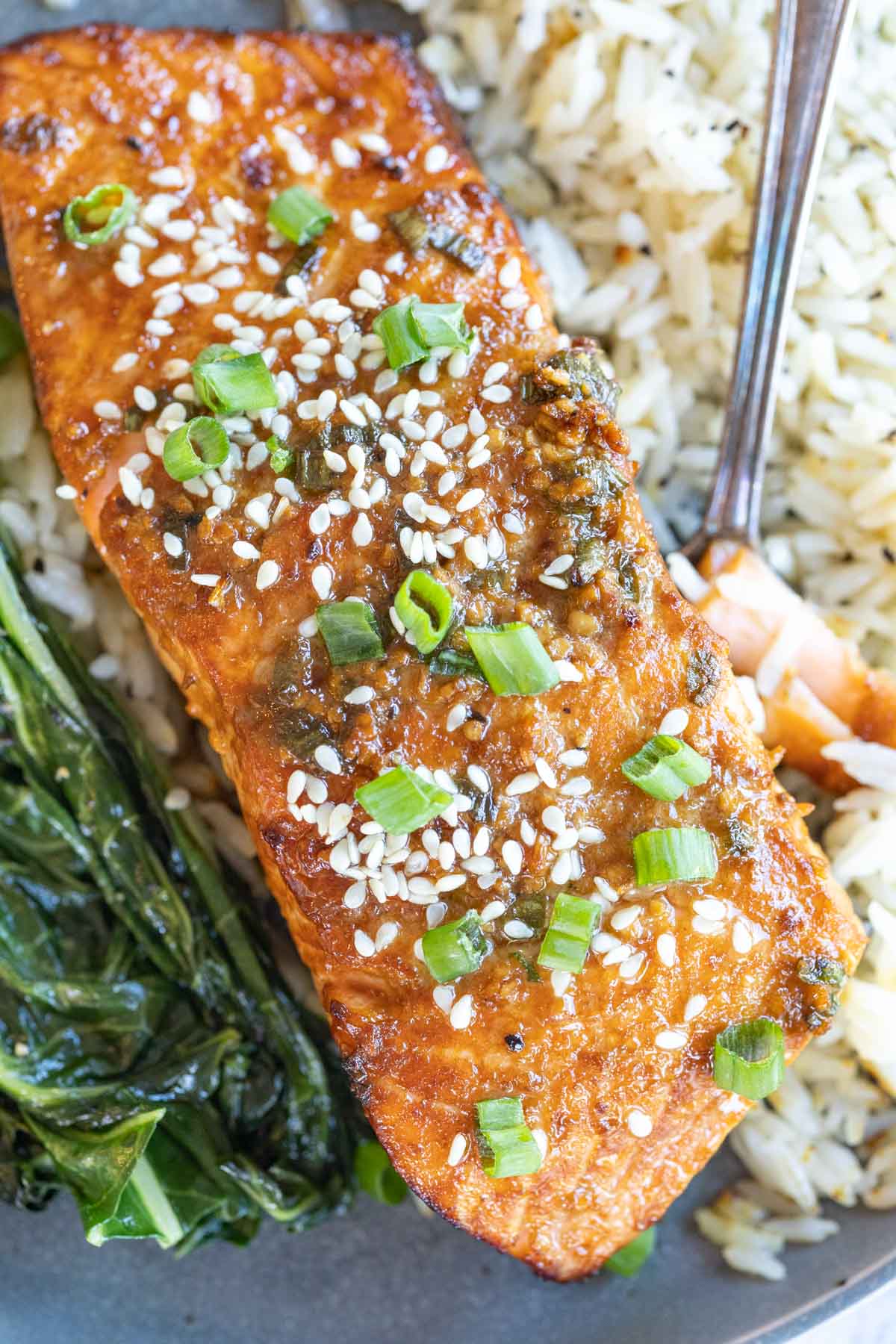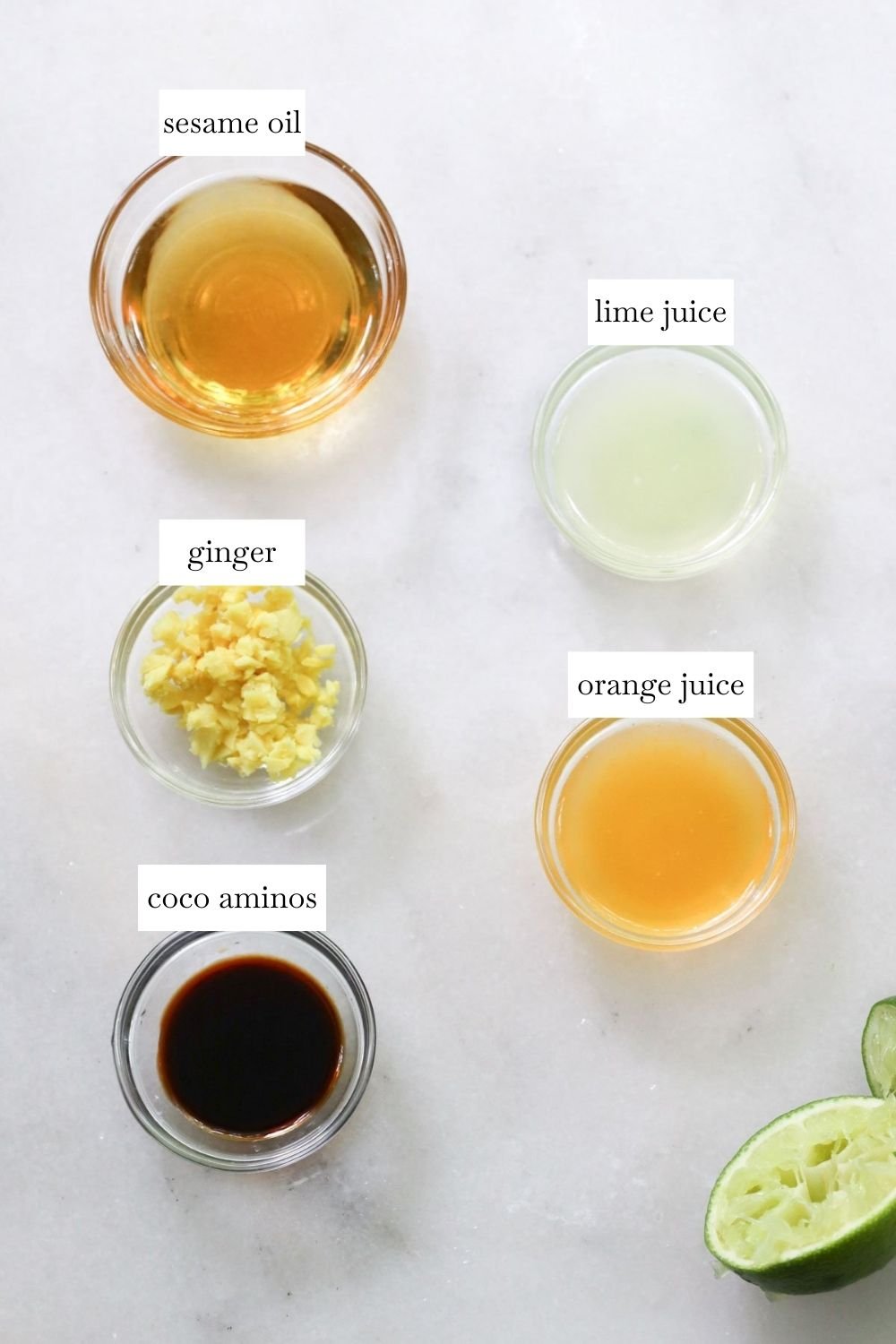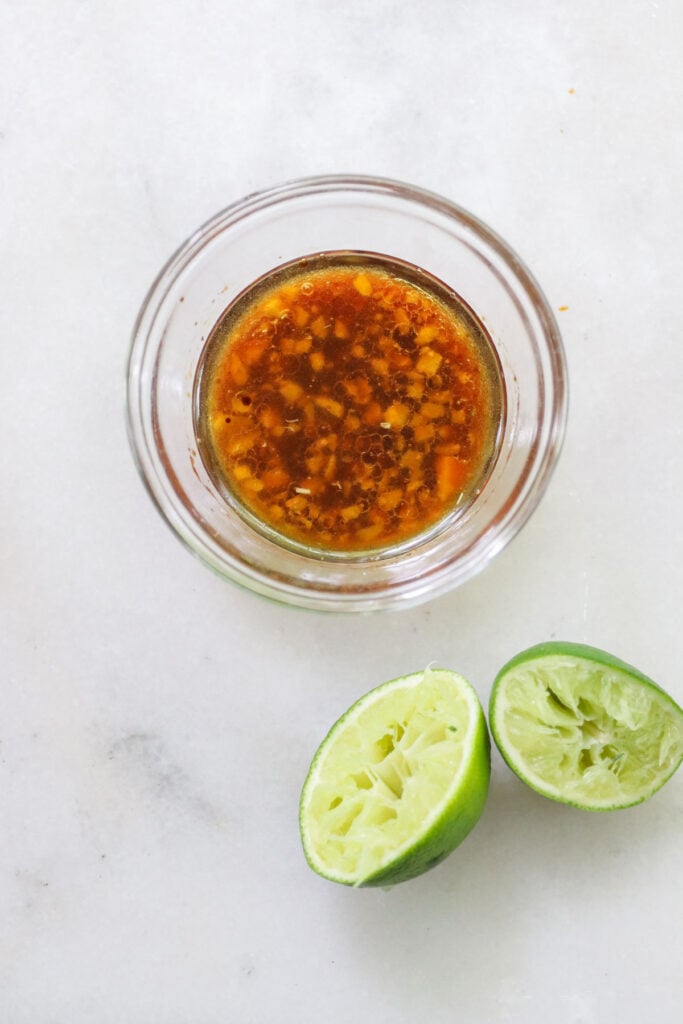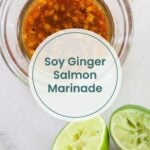Soy Ginger Salmon
This post may contain affiliate links.
This Soy Ginger Salmon is super delicious dinner that’s full of savory and zesty flavors. The 3-ingredient marinade is easy to make, and the Asian salmon bakes up tender and flaky in only 15 minutes!

Soy Ginger Salmon Recipe
Salmon is a just one type of fish that is high in protein and rich in heart-healthy, Omega-3 fats. For the nutritional benefits alone, it’s a delicious and healthy dinner idea!
Fish is perfect to make on busy weeknights because it cooks so quickly. This meal gets most of its flavor from a soy ginger marinade. Actually, it is just one of several salmon marinade recipes I have on this site!
Why You’ll Like This Recipe
- You only need 5 simple ingredients, and they are all budget friendly!
- Super quick dinner idea. The ginger marinade comes together in 5 minutes or so. Add another 30 minutes for marinating the fish, and 15 minutes for baking salmon in the oven.
- Incredible Asian flavor. The rich, meaty umami flavors of soy sauce and salmon taste fabulous with the fresh ginger and sweet and tangy citrus juices.
If you like the flavors of Asian food, you might also like my Beef and Broccoli Stir Fry recipe.

Ingredients and Substitutions
You only need 3 ingredients for the marinade, and you can use fresh or frozen salmon filets.
- sesame oil – This heart-healthy oil is commonly used in Asian cuisine. Feel free to use canola oil, avocado oil, or even olive oil instead.
- citrus juice – All you’ll need are a couple of tablespoons of orange juice and lime juice. If you only have one on hand, you can omit the other. Lemon juice is fine, too.
- soy sauce or coconut aminos – Coconut aminos is a gluten-free and Whole30 compliant soy sauce substitute.
How to Make Soy Ginger Salmon
Scroll to the recipe card for the full step by step instructions! ⬇️


- Whisk the marinade ingredients together.
- Marinate the salmon fillets.
Time Saving Tip
If you plan to use previously frozen salmon, you can put the frozen fillets right into the marinade.
- Bake soy ginger salmon in the oven, garnish, and enjoy!

How Long to Marinate Salmon
Unlike proteins like beef and pork, fish doesn’t have any fibrous connective tissue to break down. So really, marinating salmon is just to add flavor, which only takes 30 minutes or so.
In fact, if you marinate fish for too long, it can become mushy.
Not only that, but there are acidic ingredients in this recipe. If you marinate fish for much longer than 30 minutes, the acids in the citrus juice will begin to cook the fish, just like they do in a ceviche recipe.
Tips for Success
This really is a simple recipe, but here are some tips that will help you make a fantastic salmon dinner.
- Use a nonreactive bowl. When you whisk the marinade together, use a container that won’t react with the acid in the lemon juice. Anything made of stainless steel, ceramic, or glass is perfect.
- You can use skin-on salmon if you want to.
- Taste the marinade before you add seasoning. Some brands of soy sauce have a lot of sodium, so you may not need to add salt.
- Do not reuse the soy ginger marinade. After you pull the fish out of the container, immediately throw away any additional marinade, because it is not safe to reuse
Healthy Sides for Baked Salmon
- Starchy sides/grains: An Asian side dish like Jasmine rice or healthy broccoli rice would be great with your fish dinner. If you want something other than rice, you can make some air fryer sweet potato fries
- Vegetables: A dark leafy green like Bok choy is a healthy option that tastes great with baked salmon! Other veggie side dishes to consider are air fryer broccoli and purple cabbage and carrot slaw.

Storing Leftovers
Any leftover fish will keep for up to 5 days in the fridge, or up to 3 months in the freezer. Just be sure to store it in an airtight container or freezer storage bag.
Soy Ginger Salmon Recipe FAQ
Marinating salmon is a great way to add flavor, but with a soy-based marinade, it’s easy to over marinate. Keep in mind, soy sauce has a lot of salt in it, which can cause the fish to be dry. Additionally, this marinade has acidic ingredients that can begin to break down the protein after a couple of hours.
The total baking time for salmon depends on how thick the filets are. On average, it takes about 15 minutes for the fish filets to cook all the way through.
To test salmon fillets for doneness, use a fork to gently pull away a piece of the fish. If it flakes easily, it’s ready to pull out of the oven.
Other Healthy Fish Recipes

Soy Ginger Salmon
Ingredients
- 12 ounces salmon fillets 2 fillets, about 6 ounces each
- 3 tablespoons sesame oil
- 1 tablespoon lime juice
- 1.5 tablespoons orange juice
- 1.5 tablespoon minced ginger
- 1 tablespoon soy sauce or coconut aminos
- 1 pinch salt and pepper or more/less, to taste
Instructions
- Add all marinade ingredients to a small nonreactive bowl (see Note 1) Whisk well to combine. Note: You can do this up to a day in advance. Cover and store the marinade in the refrigerator until you're ready to use it.
Marinate the Salmon
- Pat the salmon fillets dry with paper towels. Transfer to a glass baking dish or heavy-duty zip top storage bag.
- Pour the marinade over the fish, then turn it over to make sure there's a nice coating on both sides.
- Marinate in the container at room temperature for 30 minutes, or cover and transfer to the refrigerator to marinate for up to an hour. Note: You can seal the bag or container and freeze the salmon in the marinade for 3-4 months.
Cooking Instructions
- Preheat the oven to 400°F (204°C). Remove fish from marinade, shaking off any excess. Set the salmon skin side down in a foil-lined baking dish.
- Pour a little of the marinade over the fish (this helps to keep it moist as it cooks). Discard remaining marinade, as it is not safe to reuse. *See Notes
- Set the baking dish in the oven and cook for 13-15 minutes, or until the fish is cooked through and flakes easily when pierced with a fork.
Notes
- A nonreactive bowl is made from a material that won’t react with acidic foods like citrus juice and tomatoes. Nonreactive materials include stainless steel, ceramic, or glass. Acids will corrode and cause damage to reactive materials.
- Reusing and/or serving marinade as a dipping sauce is not recommended. Uncooked fish, meat, and poultry contain bacteria that transfer to the marinade. Per USDA recommendations, it is not considered safe to reuse for any purpose unless it is boiled first, for several minutes.

